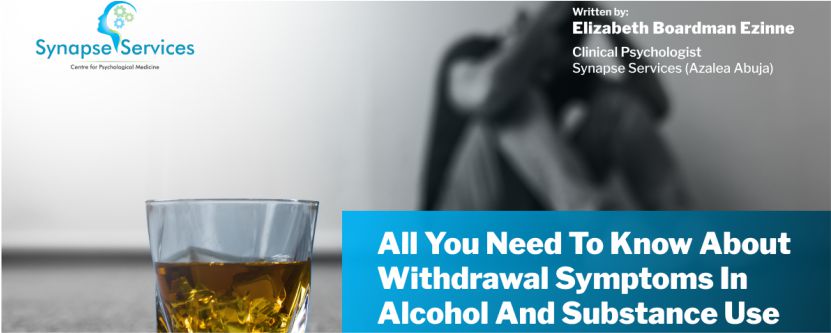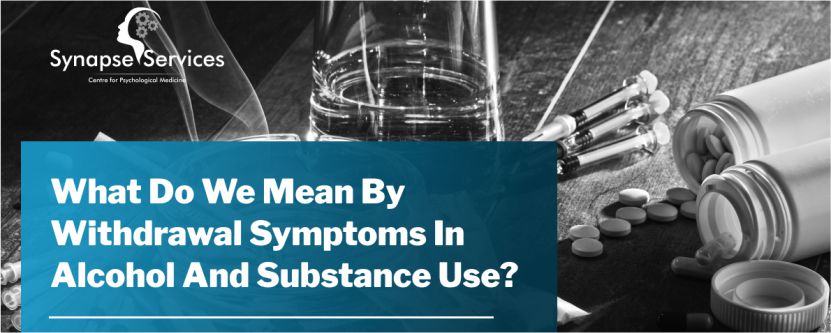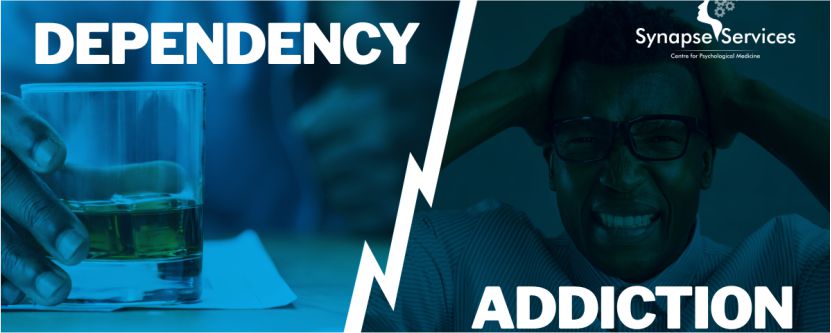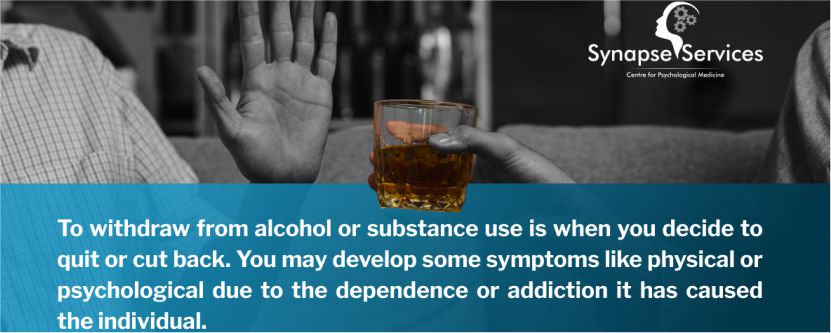
All You Need To Know About Withdrawal Symptoms In Alcohol And Substance Use.
Written by Clinical Psychologist - Elizabeth Boardman Ezinne
1st August 2023
A report by the United Nations Office on Drugs and Crime in Nigeria indicates that 14.4% (13.3 million people) between 15 and 64 years abuse substances.
In Sub-Saharan Africa, it is estimated that about 41.6% of individuals use substances, with Central Africa having the highest percentage at 55.5% and is more common in males than females
To withdraw
means to take away something from a particular place or position, to leave or cause to leave a place or position.
To withdraw from alcohol or substance use
is when you decide to quit or cut back. You may develop some symptoms like physical or psychological due to the dependence or addiction it has caused the individual. These symptoms may range between mild or severe depending on the duration of use.

Now What Do We Mean By Withdrawal Symptoms In Alcohol And Substance Use?
Withdrawal symptoms are abnormal physical or psychological features that follow the abrupt discontinuation of a substance or alcohol that has the capability of producing physical dependence.
Some Substances That Can Cause Withdrawal Symptoms
Some commonly used substances are well known to cause withdrawals in an individual. These include amongst others:
A. Alcohol
B. Benzodiazepines, CNS Depressants and sedatives
C. Marijuana
D. Heroin and prescription opioids/ opiates
E. Cocaine, methamphetamine and other stimulants like Adderall and Ritalin.
Duration Of Alcohol And Substance Withdrawal
Now you may be wondering how long these withdrawals can last for, well it depends on the individual's level of dependency/ addiction and the duration of use and other factors.
These symptoms can last anywhere and from several days to weeks and some in cases some symptoms may take a bit longer.
Note- there's a thin line between dependency and addiction.

Dependence is when an individual uses alcohol or substances almost repeatedly (i.e., every other day) that may begin to affect one’s daily life. Addiction is the inability to control the use of alcohol or substance(s), engaging in behaviours that may cause physical or psychological harm.

Withdrawal symptoms of alcohol and substance use may begin within a few hours or days after an individual's last use and can resolve within 1-2 weeks. If withdrawals persist beyond the time frame, they can be said to be prolonged withdrawals (acute withdrawals) or protracted abstinence symptoms. And some of these symptoms may include:
A. Problem sleeping (at night or during the day {insomnia}) and motivation to do certain daily activities or tasks
B. Trouble concentrating and memory impairment
C. Depression and anxiety
D. Low libido
E. Vomiting and diarrhoea
F. Sweating excessively
G. Alcohol and substance cravings, etc.
Some Factors That Can Affect The Withdrawal Timeline Include:
A. The type of substances used.
B. Duration of the use.
C. Quantity used.
D. Other substances being taken alongside (multiple substance use)
E. The individual’s characteristics and personality, including the Menayo and physical state of health.
Note- protracted withdrawal symptoms can persist for several months or in rare cases years as they tend to wax and wane over time. Some people experience the above symptoms and others may not.
How Can You Withdraw From Alcohol Or Substance Use?
It may feel uncomfortable during the withdrawal process but the good part is there are safety measures to minimize complications. Some ways to do so are:
1. Medical Detox- This is a form of addiction treatment that helps individuals with alcohol and substance use safely by providing around-the-clock care, observation and support as the body rids itself of the alcohol and substance use. Medications may be prescribed to help reduce cravings and manage withdrawals.
2. Therapy- This is a form of addiction treatment which focuses on restructuring an individual’s cognition and behaviour, helping the individual develop new ways to cope with withdrawals and cravings by learning healthy ways to manage his/herself. Group sessions and 12 Steps would be done as well as many other forms of therapy to help the individual have the best recovery.
At Synapse Services Azalea we are well-equipped to handle all types of Alcohol and Substance use, as well as other mental health problems. Our highly professional staff members can help you tackle the root cause of the problems and offer several treatment models at our standard facility, which accommodates both the inpatient treatment and the outpatient treatment program that helps sustain long-term recovery.
Your recovery is guaranteed once you’re determined and willing to accept help and support. To learn more about our services and for more inquiries do reach us at:
Website: www.azaleaservices.org
IG- @Synapse_services_ng
Phone Number: 0905 690 6007
Address: Plot 234, Cadzone, Off Norbert E Offor Street, Kado Abuja Nigeria.
P.S. We care about you and your well-being, don’t go through this alone, you’re not alone, we’ve got you.
Article Written by; Kimberly .E. Boardman
REFERENCES
An Assessment of Drug & Substance Abuse Prevalence NCBI (25, Oct 2022).
https://www.ncbi.nlm.nih.gov/pic/articles/PMC9608018/
American Addiction Center. Language Treatment Hospital April 27, 2023. Drug withdrawal: Symptoms, Causes & Timelines.
languagetreatment.com/addiction-research/drug-withdrawal/
Alcohol & Drug Foundation. Withdrawal- Alcohol and Drug Foundation (July 2021).
https://add.org.au/reducing-risk/withdrawal/
Health line media company. Drug Dependence: Symptoms, Treatment, Outlook (2016).
https://www.healthline.com/health/drug-dependence
Medical News Today. Addiction: Definition, Symptoms, Withdrawal & Treatment (May 2003).
https://www.medicalnewstoday.com/articles/323465
National Institute on Drug Abuse. (2019). Teaching addiction science.
National institute of health. National Center for Biotechnology Information Company- National Library of Medicine- published Oct 25, 2022.
National Institute of Health. Prevalence and Associated Factors of Substance Use. KD Fentwa (2022).
https://www.ncbi.nlm.nih.gov/pmc/articles/PMC91308838/
Oxford Dictionary- Definition of withdrawal
UNODC World Drug Report 2021: Pandemic effects rampage. United Nations Office on Drugs & Crime.
https://www.unodc.org/Nigeria/en/unodc-world-drug-report-2021_pandemic-effects-ramp-up-drug-risk-as-you.
RxList Medical Resource (Dec 2004). Medical Definition of Withdrawal Symptoms.
https://www.rxlist.com/withdrwal_symptoms/definition.gym
